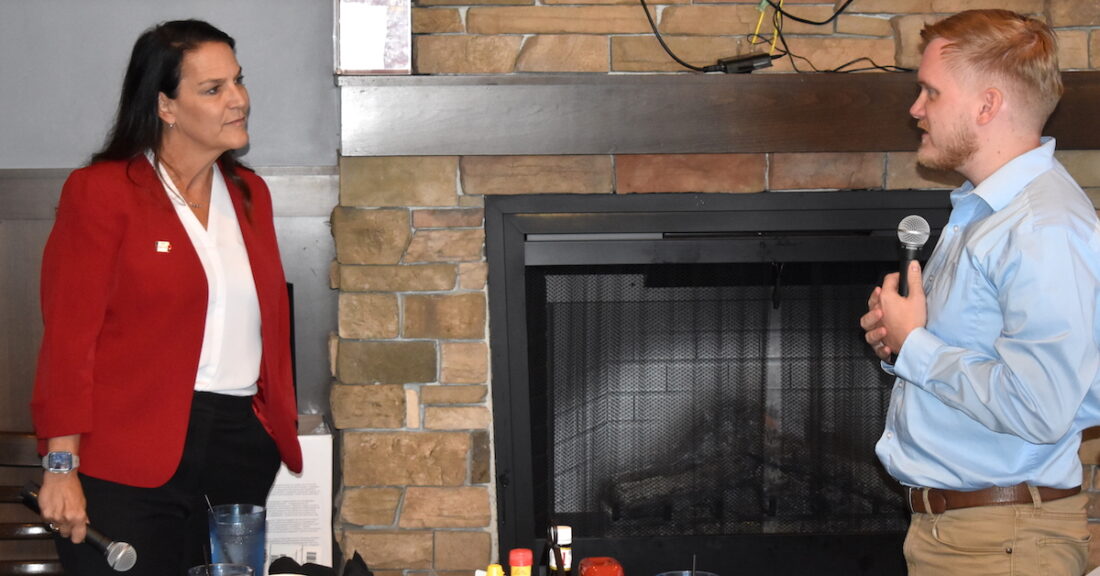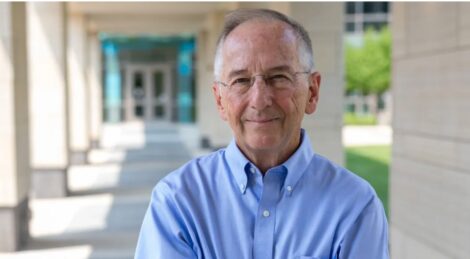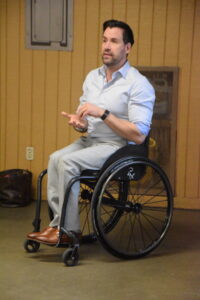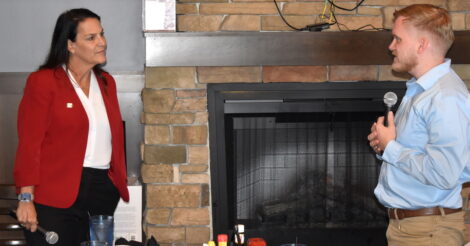Lt. Gov. Chris Cournoyer visits Pachyderm Herd Friday
Republican from LeClaire running for State Auditor in 2026 election

T-R PHOTO BY ROBERT MAHARRY Republican Iowa Lt. Gov. Chris Cournoyer, left, takes a question from Rep. David Blom (R-Marshalltown), right, during the weekly meeting of the Pachyderm Herd at Legends American Grill on Friday.
Iowa Lieutenant Governor Chris Cournoyer (R-LeClaire) has held her current position for about nine months since being appointed by Gov. Kim Reynolds last December, but in the 2026 election cycle, she’ll be vying for a new elected office as she seeks to become the state auditor.
Cournoyer spent about an hour at Legends American Grill in Marshalltown on Friday afternoon addressing the audience of about 30 people at the Marshall County Republican Party’s weekly Pachyderm Herd meeting, sharing information on her own background as a website designer who started a small business in 1997 and her journey from “Mama Bear” of four children concerned about school security after the Newtown shooting to Pleasant Valley school board president to State Senator and now Lieutenant Governor since her predecessor, Adam Gregg, resigned to become the president of the Iowa Bankers Association last year. She joked that she can see Illinois from her house near the Mississippi River and lives by the motto of looking at what Iowa’s neighbor to the east is doing politically and in turn doing the opposite.
According to Cournoyer, her calling to public service occurred after the Newtown shooting, when her twin boys were around the same age as the victims, and she called her school board member to find out what the district was doing to prevent such incidents. He didn’t return her phone call, and she eventually ran against him, winning 78 percent of the vote and subsequently leading efforts to increase mental health counseling and security at school entrances, hiring a school resource officer and implementing an anti-bullying campaign.
Ahead of the 2018 election cycle, she was approached about running for the state senate and defeated incumbent Democrat Rita Hart, who now serves as the chair of the Iowa Democratic Party, by 10 points.
“I think what’s really unique about Iowa is that we have a part-time citizen legislature, and it really does take a lot of different voices and people with a lot of different experience and voices that really come together and make better policy for all Iowans,” she said.
Along with Zach Nunn, who now serves in the U.S. House, she focused on bills related to technology — including consumer data privacy legislation — and also handled bills on hunting, guns and natural resources. When Reynolds asked her to step in as Lieutenant Governor, which she described as “the honor of a lifetime,” Cournoyer had planned to be her running mate in 2026 and serve another term before the governor’s plans changed.
“God has a plan, and he’s also got a lot of plot twists out there for me, but I really respect her decision,” Cournoyer said. “The woman gives her heart and soul to the state, and she’s done some really amazing things. And she’s ready to go spend some time with family, which I don’t blame her (for).”
As she weighed her options, Cournoyer decided to run for the state auditor seat, and she criticized the current officeholder, Democrat Rob Sand (who is now running for governor), for using his position to further his own political ambitions. Citing the governor’s effort to reduce the number of state agencies and consolidate Information Technology (IT) efforts, Cournoyer said the state has already saved $210 million in two years, which drew a round of applause.
Referencing the Iowa DOGE committee’s recommendations to streamline government thus far, she noted that most of them would still have to go through the legislative process, and public feedback will be solicited. Cournoyer said the current state auditor is across from hers in Des Moines, and more often than not, the door is locked and the lights are off.
“I’m not sure what’s going on over there, but I do see him a lot on social media eating breakfast pizza and taking selfies. I think the first thing I would like to do as auditor is do an audit of the auditor’s office. What exactly is going on in that office?” she asked.
She pledged to work with local governments as opposed to being an “adversary” and ensure that taxpayer dollars are being spent properly. Cournoyer lamented that the office has become “too political” over the last six years, citing Sand’s criticism of the Education Savings Account (ESA) program, and she said she would audit everyone and hold everyone accountable in an unbiased fashion regardless of political affiliations.
From there, she opened the floor up to a host of questions. The first came from a woman who said she had heard the auditor’s office is currently “very slow” in performing audits for government entities, and Linda Clark advocated for more oversight of nonprofit organizations due to recent embezzlement cases in Marshalltown. Rep. David Blom (R-Marshalltown) asked about the COVID testing programs and said Sand had sought private health records, and Cournoyer called it “outrageously inappropriate” before referencing laws passed to limit the information able to be collected in an audit, which Sand has criticized as “neutering” his ability to do his job.
“Again, just taking the politics out of it and the grandstanding and the political ambition. I’m running for auditor. I have no plans beyond that. I could just ride off into the sunset after that, but there’s definitely some political ambition, I think, that’s trying to get headlines by the current officeholder. And we’ve seen that a lot,” she said.
Mark Eaton noted the rising costs of subcontracted audits and what could be done to incentivize more CPAs to practice in Iowa through alternative pathways, and Cournoyer and Blom said a bill to that effect passed both chambers with unanimous support during the 2025 session. Cournoyer and Marshalltown Mayor Joel Greer, an attorney by trade, described a similar shortage of lawyers — particularly public defenders — in rural areas across the state, and she stressed “creative solutions” to address the problem. Greer also asked about the ESA system and the fact that private schools have raised their tuitions as a result, which prompted Cournoyer to clarify that Iowa does not have a “voucher” system with a blank check to parents but rather an ESA program that does have regulations and safeguards only allowing the funds to be utilized for approved uses.
After explaining her own initial trepidation about ESAs, Cournoyer said public schools have not seen the “mass exodus” that some predicted — the superintendent at Davenport, for example, said “bring it on” and welcomed the competition. Of the 520,000 students in Iowa currently, she added, only 16 percent are utilizing some form of school choice, whether online, private, homeschooling, public charter schools and open enrollment to other public school districts.
Within that 16 percent, only seven percent are going to private schools, and nine percent are simply attending other public schools. In the area where she lives, Cournoyer cited the example of 400 students open enrolling out of Clinton to other public school districts — only nine of them used ESAs in the first year of the program.
When a student does use an ESA to attend a nonpublic school, Cournoyer said the home public school district still gets a $1,200 check for that student. Blom noted that with the new $50,000 minimum teacher salary requirement at public schools, private schools have struggled to keep up with those pay rates.
Ultimately, Cournoyer felt that the growth of other school settings will depend on the level of demand from parents and students.
“Sometimes, kids get lost in the public school system or they don’t have a lot of support at home or whatever the case is. I just believe that you shouldn’t be stuck in a place that’s not good for your kid just because you can’t afford the cost of getting them out,” she said. “So we’ll see how it plays out. We’re keeping a close eye on it.”
The final question of the afternoon came from Ray Mitchem, who asked about the potential of artificial intelligence (AI), which garnered an excited response from the self-described “tech nerd” as Cournoyer recalled an eighth grade project she completed on AI in 1984. The concept itself isn’t new, but its applications have ramped up dramatically in recent years.
The goals, Cournoyer said, should be to protect privacy without stifling innovation, and she referenced a bill in Colorado that has created “a real mess” with vague definitions and restrictions on AI. She did feel that regulations should be handled federally to avoid conflicting laws across all 50 states and that AI should be used “ethically and responsibly” in educational settings to ensure students are not using it to replace learning and critical thinking.
Cournoyer also predicted that a bill related to AI will likely be introduced in the Iowa House during the 2026 legislative session.




